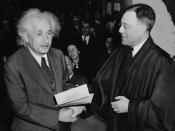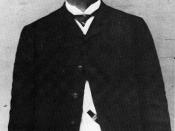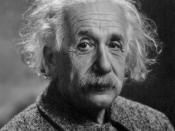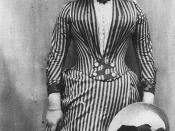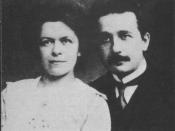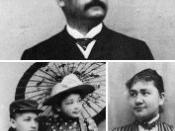Albert Einstein For my book report I chose a book on Albert Einstein. Albert is the world's genius of genius's. The reason I chose this book was because I was interested in him and his life. I wanted to know what his childhood was like growing up. Even more I wanted to get into his mind. In my report you won't here about most of his theories. You will learn about his life, his happy times and, times that brought much grief.
In 1876 a young businessman, named Hermann Einstein married Pauline Koch. Not but three years later Pauline gave birth to a baby boy. They named him Albert; little did they know their son would become a genius.
Albert's father, Hermann was a small businessman with an easygoing attitude towards life. No matter how bad things got he always felt, "Something would turn up." Incurably optimistic, he would go from one business failure to another without changing his happy go lucky philosophy.
Unfortunate Hermann's easygoing attitude did not make for success. In 1880 the family moved to Munich, moves would become an old story while Albert was growing up. One year after they moved the Einstein family got another bundle of joy. This time it was a girl, they named her Maria ("Maja"). The Einstein's family was complete and Hermann and Pauline were happy. But soon they began to worry about their son's progress. He seemed much slower at learning the other children did. No body saw any signs of a future genius in Albert. Even when Albert was nine, his speech was not fluent. His parents feared for a time that he was retarded. When Albert was four or five and sick in bed, his father brought him a gift. The gift was a magnetic compass, and with that Albert started thinking about magnetic fields and empty space, thoughts that stayed with him for many years.
Albert's first school was a Catholic elementary school close to home. Although Albert's family was Jewish, it was convenient and much cheaper than sending him to an expensive Jewish school. Albert was a rebellious, stubborn student in both elementary and high school. He hated the strict discipline and the learning by memorization and the teacher's unwillingness to consider new ideas. Albert wanted to be left alone to do his own thinking. He called his elementary school teachers, "sergeants" and his high school teachers, "lieutenants." School was not a happy time for Albert; he wanted to be able to think freely. Not being able to learn with questioning made him suspicious of all authority. His motto was, " How do we know that is true? Where is the proof?" Albert stayed in school until he was ten years old. His lack of attitude and hesitant speech made him unpopular with the teachers. One day Hermann went to the school headmaster to ask what future career his son should follow. He was told that it did not matter, for Albert would never amount to anything.
What Albert didn't learn at school he was taught at home. His Uncle Jakob was the first to introduce him to the wonders of algebra. His mother, Pauline was a music lover and insisted that Albert learn to play the violin at an early age. His love for music grew and soon he related music into algebra. It was a custom at that time for a family to invite a poor Jewish student to share a meal once a week. Einstein's guest was a medical student named Max Talmey. He was a strong influence on young Albert. Albert's desire to learn physics required higher math, so Tamley gave him a beginner's book of geometry. In a few months Albert had worked himself through the whole workbook. From here on Albert devoted himself to learning higher mathematics, learning it all by himself. Max Talmey was a great help to Albert; he gave him many books on science and philosophy. Talmey once said, " Soon the flight of his mathematical genius was so high I could not follow." Unhappy in school young Albert was dealt another blow in 1894: separation from his protective family. His father's business had failed. Taking their daughter, Maja, his parents moved to Italy where his mother's wealthy relatives lived and were willing to help. Sixteen-year-old Albert was placed in a boarding house run by a distant relative. After six months he decided to leave Luitpold school and Munich, and follow his parents to Italy. This meant that he would be leaving before he got his diploma. Albert decided to take a leave of medical absence. Somehow he convinced a doctor that separation from his parents brought him to the edge of a nervous breakdown. The doctor gave him a medical certificate saying that a period of rest in Italy was necessary to his health. Albert's plan turned out to be unnecessary. Before he could even show the medical certificate, Albert was told that he was to be expelled from school. The reason that he was being expelled was because the teachers thought that he was unruly in class and that his undisciplined behavior had affected the rest of the students. Young Einstein packed up his belongings and followed his family over the Alps to Milan. Herman's new business there soon failed, and they moved to Pavia.
Even through all the problems that were occurring, Albert was happy. He loved Italy. Due to Albert leaving Luitpold before he got his diploma shut many doors for his future career. He couldn't go to a German university. His Italian wasn't good enough for an Italian college. Albert knew it had to be a school outside Germany. It had to be a school that taught electrical engineering, for his father insisted. Just over the Alps in Switzerland, was a technical school, the Federal Institute of Technology. Entrance did not require a high school diploma but you did have to pass an examination. The age to get into the school was eighteen and Albert was only sixteen. He hoped his advanced study in science, physics, and mathematics would cover the poor understanding of the other subjects on the test. Albert failed to get in by not passing zoology, botany, and modern languages. His future looked very dim. Failing the entrance exam for FIT was a set back for Albert. But others had seen his test results too! Young Einstein's performance in mathematics and physics had been outstanding. The head of the FIT urged him to study one year at a secondary school in Aarau. This diploma would allow him to enter FIT without taking the entrance examination. Albert was so pissed off at Germany he asked his father if he could renounce his German citizenship. The paper work took over a year, and when it was complete he was legally "a stateless person born of German parents." He would remain without a country until he was twenty-one when he became a Swiss citizen.
In the summer of 1896 he had his degree and admitted to FIT. That fall he started his four-year course for teachers of physics. Albert's rebellious ways disappeared at his new school while his attendance grew worse. He quickly found that they were teaching the old "classical" physics of Newton while he already knew were out of date. Soon he was in danger of failing, a generous friend lent him his lecture notes and by cramming he passed.
On the tiny money he earned he found many enjoyable things to do. He liked to talk walks into the hills, eat cheap meals with good conversation. There were nights of music, Einstein would play the violin and Mileva Maric, a fellow student from Serbia. This is the woman Albert would later marry.
After four years at FIT his teachers said they found him to be stubborn. He was a poor experimenter, once he even tore up the instructions and tried to do the experiment his own way. It didn't work.
After graduation Albert lacked of money, so he moved back home to his family in Milan. He started writing letters to well know professors asking for a job as an assistant. All he had to offer, as credentials were several papers published in the German Annals of Physics. He returned to Switzerland and supported himself by part-time teaching and tutoring. His application for Swiss citizenship was granted in February 1901. All Swiss citizens had to serve in the army, but Einstein was rejected for flat feet and varicose veins. Soon his little part time jobs dried up and he need a job a fast. Still this time in his life, an old friend gave him a helping hand and earned his eternal gratitude. It was the same fellow student who saved him by lending him his notes. His name was Marcel Grossmann and his father knew the head of the Swiss Patent Office in Bern. Marcel said there would soon be on opening for a second-class examiner, the pay was small but he needed regular work. He applied as soon as it was advertised, he did not have the engineering background needed he impressed the interviewers with his knowledge of higher mathematics and the new physics. Albert had to wait seven months for the job to be offered to him, and when it was he took it. He didn't care about the smaller salary because he wanted to get married. The work in the Patent Office turned out to be enjoyable for Albert. His job was to inspect applications for patents, which included the blueprints of the claimed invention plus a working model. Even knowing little engineering, he could quickly grasp wither the things could work or not. His superiors were impressed at the speed he worked. What they didn't know is that Albert was doing a few of his own calculations of his own. He would scribble on bits of paper that could easily be shoved in a drawer when a superior passed by.
In January 1903 Albert married Mileva Maric, his fellow student at FIT. It was not a happy marriage despite the birth of their two sons. Perhaps as a physicist, Mileva felt that she should share in her husband's triumphs, but she could not grasp his theories, and Einstein refused to take time and explain them. It was a mistake the Einstein's realized in time. Like most unhappy couples they tried to hide their failure from the rest of the world. What he wanted from a wife was the freedom to do his work, without having to worry about the household, the children, his food, and his clothing. What his wife wanted was a partnership, a partnership she would never be able to have with Einstein.
In the same year he published another paper that has effected the coarse of history. It came out of his special theory of relativity, again through a "thought experiment," which seemed unprovable by experiment. "What happens," he asked, "when an atom changes by sending out light rays?" Albert found that the light carried off energy and that the mass of the atom decreased. This led to the most famous formula in physics: E=mc2. The light energy was equal to the change in the mass multiplied by the square of the speed of light. This meant that energy and mass were the same. The atom bomb and the horror of nuclear was, Hiroshima and Nagaski, all lie in this simple equation. It was not something Einstein saw; no man could see it.
Over the next four years, people started noticing the you new star of physics. Some people can to Bern to visit him and were surprised when he wasn't there. They started to go to the Patent office and were shocked to find him at his desk surrounded by piles of patent applications. In 1908 Albert became a part-time teacher at Bern University. It was an unpaid post, relying on the students who took his course to pay a fee. Albert was a poor lecturer too absorbed in his own thoughts, therefor he received little money. Only a year later his growing fame brought him an offer from the University of Zurich. At the age of thirty, he was made an associate professor of theoretical physics. After seven years at the patent office he finally felt secure enough to resign from his post. He soon found that being a professor was much different from being a patent clerk. Soon people started treating him as an equal. Many universities wanted Albert, offers were pouring in from Vienna, Netherlands, Utrecht, and from Prague where the offered him a full professorship. He spent eighteen years at Prague, his academic wandering was not over. Albert's move from Prague was brought on by his wife's unhappiness there and her love for Switzerland. Einstein was not a man who usually worried about his wife's wishes. Although Mileva was a physicist as well, Albert made it clear to her that her job was to run the house, and take care of the children. In the summer of 1914, she took the children to Switzerland for a vacation, she never returned. It was clear that the marriage was over.
In August 1914, the First World War began. During this time Einstein became very ill. It was an attack of a stomach illness. Alone with no family Albert had to face it on his own. Living in Berlin at that time was his father's cousin, Rudolf Einstein, whose wife was Albert's aunt (his mother's sister). Their daughter Elsa was a childhood playmate of Albert's from back in Munich, it was she whom took care of Albert during his illness in 1917. Elsa was a very plain young woman whom was recently divorced , with two teenage daughters. She was completely clueless about physics. They became very close friends, and soon they were more than friends. In February, he had arranged a divorce by mutual consent with his wife, Mileva. He was expecting to get the Nobel Prize and, promised to support the family when he did. Not even five months after that he married his cousin Elsa. Back in Albert's day it was acceptable to marry your relatives. Now days you can't, thank god! Albert never doubted that he would figure out what the great design of the universe was. Relativity was his first major step. In 1920 Albert hit the jackpot and came up with the formula, E=mc2, this theory wasn't proven, but, "Photons , the proof that atoms exist, the photoelectric-effect explanation, and other work all proved he was a great leader in physics." Albert's life was full of ideas and looking for explanations.
Shortly after midnight on April 18th 1955 Albert began muttering German in his sleep. Before the doctors could be called Albert's week artery broke; he died. He insisted that there be no funeral, grave, or monument. No one knows for sure where his cremated ashes went.
After reading this book I learned a lot about him and his life. I learned everything about him that I wanted to know. Albert's life seemed so simple to me at first, and now I know what he had to go through to make where he did. Some times I wonder what our life's would be like without great people like Albert. These people defiantly changed our coarse of history. One thing is for sure, history wouldn't be the same if he hadn't figured out some of his theories.
